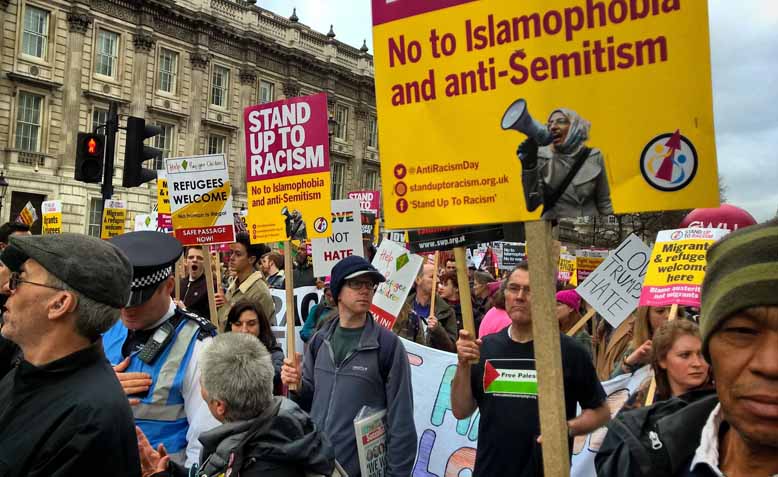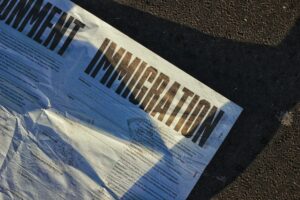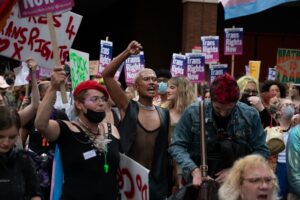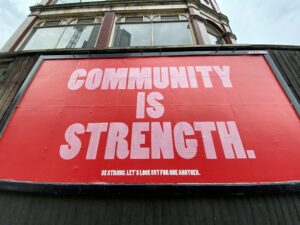Discrimination is a danger to democracy: attacks on minoritised communities in the election period must end now

This blog argues that actions from across the political spectrum during the election period that have targeted people and groups affected by intersecting forms of inequality is dangerous for democracy.

Election periods are infamous for the escalation of political tensions. Both between and within political parties, harmful and abusive rhetoric is too often assumed ‘fair game’ in an electoral system that realises a ‘winner takes all’ mentality of governance.
The political environment within the UK was already widely acknowledged to have been one characterised by division and polarisation. That the first weeks since this election was called have been marked by actions across the political spectrum that have targeted people and groups affected by intersecting forms of inequality is therefore not surprising: but it should still be shocking.
Already, Parties have been accused of ‘picking-off’ minoritised candidates in selection processes, marking Pride month by announcing policies that threaten the rights of transgender people, and using ‘dog-whistle’ racism in suggesting Sunak ‘does not understand our culture’ after he left a WW2 commemoration early. These are just a few of the moments in the campaign so far that reinforce the idea that weaponizing prejudices towards minoritised people and communities is a legitimate way to court votes.
(De)selection of minoritised candidates
Within the first week of the election period, in what some have described as a ‘purge’ of left-wing candidates within the Labour party, news hit that Diane Abbott, Faiza Shaheen, and Lloyd Russell-Moyle were barred from standing. This move arguably amplified factional tensions within the party since both Abbott and Russell-Moyle are part of the Socialist Campaign Group associated with Jeremy Corbyn, from which the current Labour leadership has sought to distance itself. It has later been confirmed that Abbott will be standing in her seat following the considerable controversy and conflict that resulted from the alleged ban.
This factionalism and intolerance to a diversity of ideologies within parties has in itself been seen as ‘bad for the country’ – and for democracy – since within a political system currently dominated by two major parties, political pluralism is what it means to be a ‘broad church’. But the fact that these candidates are a Black woman, a Muslim woman and a gay man also cannot go unnoticed. Nor can the international political context and influence of the genocide in Gaza.
Diane Abbott’s long history of experiences of ‘misogynoir’ as Britain’s first Black female MP most recently includes being the subject of a comment from a Tory party donor inciting the murder of Black women in relation to his feelings about her. She was then silenced in the Parliamentary debate about her that followed these events. That she is one of the very few people who has experienced sanctions on her position in Parliament in relation to comments comparing forms of racial discrimination- comments which she later, swiftly and unreservedly, apologised for– speaks volumes. Notably Boris Johnson’s infamous comments comparing Muslim women to ‘letterboxes’ did not prevent him from becoming Prime Minister.
Meanwhile, Faiza Shaheen, a working class Muslim woman, was deselected on the basis of ‘liking’ a tweet that suggested that pro-Israeli groups are professionally organised. This has been interpreted as implying condonance of anti-semitic tropes in relation to conspiracies about Jewish communities. She apologised in recognition of the harm caused by reference to this trope. Meanwhile, defenders of Shaheen have highlighted the importance of making a distinction between pro-Israeli campaign groups and Jewish people and communities.
Labour has lost support from many Muslim voters due to its stance on the genocide in Gaza. At the same time, virulent Islamophobic rhetoric in Parliament which has a long history but currently manifests in particular through the conflation of Palestine solidarity groups with ‘hate mobs’ has exacerbated inequalities in how people’s civil and political rights are policed – through the so-called ‘Defending Democracy Protocol’, updates to the ‘Prevent Duty’ that have been found to be ‘incompatible with human rights’, and discriminatory provisions in the Criminal Justice Bill. It is in this context that The Muslim Council of Britain has had to make a call for political leaders to not treat Muslims as a ‘punching bag’ in the General Election.
Dog-whistle racism, targeted at Sunak
There has been significant critique of policy produced under Sunak’s leadership in relation to reinforcement of multiple forms of inequality, including racism in regards to the rights of refugees, and Islamophobia specifically – particularly in relation to Palestine.

Yet, at the same time, Farage’s recent personal remarks about Sunak build on racist narratives that have been widely directed at the UK’s first BPOC Prime Minister himself since he took office. Persistent commentary in relation to his height arguably reinforces ‘toxic’ ideals of masculinity that perpetuate prejudice against South-Asian men. This example alone illuminates the complexity of how issues of discrimination manifest in the politics, culture and history of the UK, and in this election.
Marking Pride month by announcing policies that threaten the rights of transgender people
Meanwhile, fears in the LGBTQIA+ community that trans people would yet again be made a target as part of a ‘manufactured culture war’ in a ploy for votes have been realised in Sunak’s announcement on proposed policy changes to the Equality Act that would make it ‘easier to discriminate and increase the hostile environment’ for trans people in the UK. As the majority of the pre-election period now falls within Pride month, it has been anticipated that political shows of support for celebrations in London at the end of June will constitute no more than ‘pinkwashing’ of the realities of trans people’s lives created by this policy environment, and harmful rhetoric from both major parties – and across the political spectrum – in relation to trans lives and rights.
As trans activists have argued, these proposals are unlikely to be effective in their alleged purpose of protecting cisgender women from patriarchal violence, whilst further entrenching tired tropes that conflate trans people, who are four times more likely to be victims of violent crime than cisgender people, with predators – as well as making it harder for trans and LGBTQIA+ people to access healthcare and social services. Citizens have a human right to healthcare – stipulating exceptions to this is both dehumanising and fundamentally undemocratic.

A figure who has spoken to these issues is Lloyd Russell-Moyle; who has used the power afforded to his voice as an MP in Parliament to speak out on toxic levels of transphobia in the House of Commons, to defend the right to protest, and to go against the Labour whip in voting for a ceasefire in Gaza. This has made him a ‘controversial’ figure for some, and it is for this reason that Russell-Moyle and his defenders believe that his sudden suspension from the Labour party on the basis of a ‘serious complaint’ was politically motivated.
It is also a problem for queer representation – as Russell-Moyle was one of a minority of MPs who is open about his LGBTQIA+ identity; important as the representative for Brighton’s Kemptown and Peacehaven seat – with a high LGBTQIA+ constituent population. Whilst Pink News has provided helpful guides to each parties’ position on policies in relation to LGBTQIA+ rights, they have also highlighted the fact that Russell-Moyle is just one of a list of LGBTQIA+ MPs who are now not standing for election – and at a time when hate crime against LGBTQIA+ people has increased, and queer representatives are needed more than ever.
This series of events- and the many that have preceded and will no doubt follow them- demonstrate that the weaponisation of prejudice is a problem across political parties. It is not only those Parties that are polling highest at the moment either (at the time of writing, the BBC has Labour on 41%, Conservatives on 20% and Reform on 17%). A former Liberal Democrat candidate claims he has been deselected due to ‘discrimination because of his Christian beliefs’, whilst the battle against transphobia in The Green Party is ongoing.
Discrimination is a danger to democracy – and whatever our differences – a danger to us all
Of course, inciting division is often seen as a legitimate political tactic. It weaponises the trauma people have experienced as a result of deep economic inequality, isolation, and the social prejudices of which so many of us have deeply held personal experiences. It is an age-old approach that reaches into the darkest and most painful parts of ourselves, and incites them into defence and self-protection, shutting out others that we are told are a threat to our own safety.
It is therefore more important than ever in those moments to look into those parts of ourselves and recognise the pain that is there ‒ and give space to honour it ‒ and choose instead to find the best and most compassionate part of ourselves. So let’s use this political moment as a chance to come together – both within the communities we hold dear to us, and across communities – that are all very different – but have been traumatised by so many of the same problems, and work together in solidarity to build something better.

It is in this spirit, underpinned by a deep understanding of the issues, that many are doing some practical thinking on how Parties can show up differently. The Runnymede Trust pre-emptively produced a paper on the risks of the influence of racist narratives in the 2024 election, and the consequences for those targeted as part of this ‘political theatre’. Meanwhile, The Fawcett Society has campaigned for this year to be a ‘zero-misogyny election’; whilst Compassion in Politics and the Jo Cox Foundation have called for candidates to sign a ‘civility pledge’ to make a commitment to more respectful behaviour in politics.
This work by those in the democracy sector seeks to rehabilitate our politics, and is cause for hope. But it’s going to require more. Ultimately, it requires us to reject the politics of division for electoral gain, and be stubborn in our insistence that people in the UK – and our democracy – are better than our ‘politics’ often makes us look.
